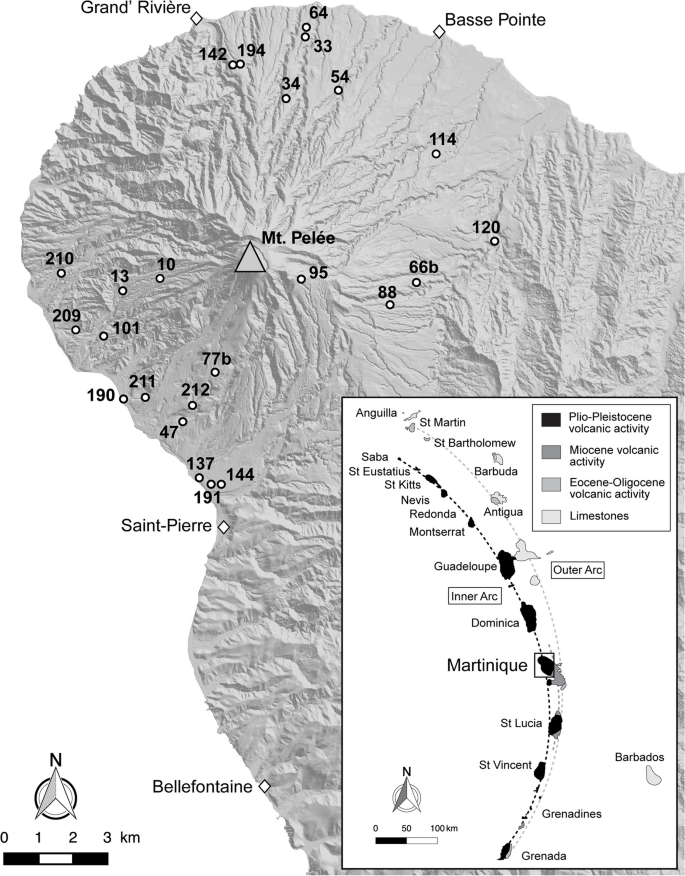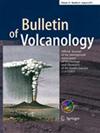Fragmentation behavior of young pyroclasts from Mt. Pelée, Martinique
IF 3.2
2区 地球科学
Q1 GEOSCIENCES, MULTIDISCIPLINARY
引用次数: 0
Abstract
Abstract The stratovolcano Mt. Pelée, Martinique, exhibits eruptive styles ranging from dome formation to sustained, highly violent explosive activity. Historical eruptions have produced lava domes and pyroclastic density currents, collectively termed Peléan activity. In pre-colonial times, several Plinian eruptions took place. Here, we explore physical controls on the proportions of fine particles produced—i.e., the fragmentation efficiency—during primary fragmentation. Samples were collected from ignimbrites from the 1929–1932 and 1902–1905 Peléan eruptions and the P1 (1300 CE), P2 (280 CE), and P3 (79 CE) Plinian eruptions. All samples are andesitic in bulk composition and contain a rhyolitic groundmass glass. The Peléan materials are more crystalline and less porous than their Plinian counterparts, a consequence of more extensive outgassing during dome formation. Representative blocks were cored and experimentally fragmented following rapid decompression (> 1 GPa·s −1 from initial pressure between 5 and 20 MPa). Dry sieving allowed for determining grain size distributions, from which the fractal dimensions, D f , were calculated as a quantification of fragmentation efficiency. Our results indicate different behaviors for Peléan and Plinian samples. While fragmentation efficiency is positively correlated with applied potential energy for Peléan samples, this relationship is not observed for the Plinian samples, possibly due to syn-fragmentation gas escape above a certain porosity. The rapid decompression experiments were designed to minimize secondary fragmentation by shear along the walls or impact while preserving the entirety of produced materials. Thus, our experimental grainsize data are physically linked to sample textures and overpressure. By comparison with natural pyroclastic products—commonly incompletely preserved—we can approach quantitatively constraining the energetic conditions underlying individual eruptions.

马提尼克佩尔萨伊山年轻火山碎屑的破碎行为
马提尼克岛的层状火山佩尔萨梅火山呈现出从圆顶形成到持续的、高度剧烈的爆发活动的喷发风格。历史上的火山喷发产生了熔岩穹丘和火山碎屑密度流,统称为pelsaman活动。在前殖民时期,发生了几次普林尼火山喷发。在这里,我们探讨了对产生的细颗粒比例的物理控制。表示主分片期间的分片效率。从1929-1932年和1902-1905年pelsaman火山喷发和P1(公元1300年)、P2(公元280年)和P3(公元79年)Plinian火山喷发的火成岩中收集样本。所有的样品都是安山岩的大块组成,并含有流纹岩的底物玻璃。pelsaman材料比Plinian材料更结晶,更少多孔,这是在圆顶形成过程中更广泛的除气的结果。代表性块在快速减压后取芯并实验性破碎(>1 GPa·s−1从初始压力在5和20 MPa之间)。干筛允许确定粒度分布,从分形维数,df,计算作为破碎效率的量化。我们的结果表明pelsaman和Plinian样本的行为不同。pelsaman样品的破碎效率与应用势能呈正相关,而Plinian样品则没有观察到这种关系,可能是由于在一定孔隙度以上的同步破碎气体逸出。快速减压实验旨在最大限度地减少沿壁剪切或冲击造成的二次破碎,同时保持生产材料的完整性。因此,我们的实验粒度数据与样品纹理和超压有物理联系。通过与通常保存不完整的天然火山碎屑产物进行比较,我们可以定量地限制单个火山喷发背后的能量条件。
本文章由计算机程序翻译,如有差异,请以英文原文为准。
求助全文
约1分钟内获得全文
求助全文
来源期刊

Bulletin of Volcanology
地学-地球科学综合
CiteScore
6.40
自引率
20.00%
发文量
89
审稿时长
4-8 weeks
期刊介绍:
Bulletin of Volcanology was founded in 1922, as Bulletin Volcanologique, and is the official journal of the International Association of Volcanology and Chemistry of the Earth’s Interior (IAVCEI). The Bulletin of Volcanology publishes papers on volcanoes, their products, their eruptive behavior, and their hazards. Papers aimed at understanding the deeper structure of volcanoes, and the evolution of magmatic systems using geochemical, petrological, and geophysical techniques are also published. Material is published in four sections: Review Articles; Research Articles; Short Scientific Communications; and a Forum that provides for discussion of controversial issues and for comment and reply on previously published Articles and Communications.
 求助内容:
求助内容: 应助结果提醒方式:
应助结果提醒方式:


